Breeding
Breeding from your Soft-Coated Wheaten Terrier

If you are thinking about breeding from your Soft-Coated Wheaten Terrier, there are some important considerations which you should be aware of. We hope that the following information will help you make an informed decision; one which is not only right for you and your bitch or dog but also right for the future health and vitality of the breed as a whole. Breeding and raising a litter of puppies can be a wonderful and rewarding experience, but it is also hard work, very expensive and sometimes heartbreaking.
There are lots of books and online resources available to help the novice breeder. The mating process itself is well documented, as is pregnancy, birth and the care of new born puppies.
The information given here is specific and intended to help you breed a litter of Soft-Coated Wheaten Terriers which will be an improvement on both the dam and the sire, puppies who are excellent examples of the breed standard with a reduced risk of inherited disease, thereby ensuring the breed quality and genetic health of future generations of SCWT.
AIM TO BREED A PERFECT PUPPY!

The breeder of your bitch is the first person with whom you should discuss your ambition to breed a litter. Your breeder should be able to advise you whether your bitch is good example of a SCWT, one who together with the right dog, will produce puppies that contribute to the quality of the breed. Your breeder should be able to help you identify genetically compatible stud dogs. An experienced breeder is an extremely valuable asset when you are new to breeding. You are likely to need advice and reassurance at some point in the process and most breeders are happy to share their knowledge and experience, particularly if they bred your bitch.
You need to plan well in advance. Good breeders spend many months looking at potential stud dogs. They will examine pedigrees, check coefficients of inbreeding (COI), identify common ancestors (very important when looking for known health problems) and also observe as many dogs as they can in the show ring. Only then will they make a decision about which stud dog they would like to use.
If you are the owner of a dog who may be used as a stud, on either your own bitch or someone else’s, you will also have a number of things to do before this happens and these are explained further down.
Responsible breeders always aim to produce healthy, well-socialised puppies with excellent temperaments. Raising pups which fit this description requires a lot of dedication and will completely take over several months of your life. When you decide to have a litter, you are taking on a huge responsibility and you owe it to your bitch and the puppies to make sure you are able to cope with any challenges and problems which may lie ahead.
In the following sections, you will find information and some basic questions which you should be able to answer before you start the process of breeding a litter.
If you wish to download or print off a copy of the following sections, you can find a link to allow you to do this at the end of webpage.
Is your Bitch old enough to breed from?
Your bitch should be both physically and mentally mature before she is mated. The SCWT Club of GB’s Code of Ethics, Section 26a, Brood Bitches states: ‘I will not allow my bitch to be mated before the age of two years.
Your bitch should also be fit and in good physical health before she is mated. She should be a normal weight, neither underweight nor overweight. Underweight bitches will not have the physiological reserves needed for feeding a litter and overweight bitches can develop problems during their pregnancy and labour.
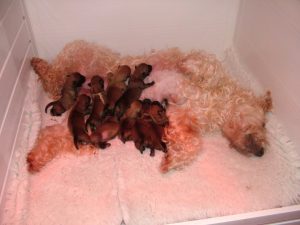
Is your Bitch 'A Quality Example of the Breed'?
A good breeder should always try to produce a litter which is an improvement on the quality of both parents so before you start to look for a stud dog, can you answer ‘yes’ to all of the following questions?
* Is your bitch a good example of a Soft-Coated Wheaten Terrier. Does she conform to the Breed Standard?
* Are you able to recognise any faults she may have which a well chosen stud dog will improve on?
* Does your bitch have the right temperament to raise a litter of puppies?
* Is she happy and confident wIth strangers, children and other dogs? An anxious or aggressive bitch can have an influence on the temperament of her puppies.
If you are not confident that you are knowledgeable enough to answer the questions about your bitch’s conformation, familiarise yourself with the Breed Standard. Try to attend as many breed shows as possible to help you ‘get an eye’ for a good dog. Talk to SCWT exhibitors and breeders who may be willing to help and advise you. The Breed Standard is the blueprint for breed excellence; you can find a copy on this website in the section titled ‘BREED’.
It is strongly recommended that you also buy a copy of the Club’s Expanded and Illustrated Breed Standard, which is available to buy at Club events and from the website shop.
However, breeding a litter is not just about producing beautiful puppies. A responsible breeder will plan each mating to ensure they produce puppies with excellent temperaments who are as healthy as possible with low risk of any inherited disease. This ‘blueprint’ will increase the probability that each puppy will live a long and happy life with its new family.
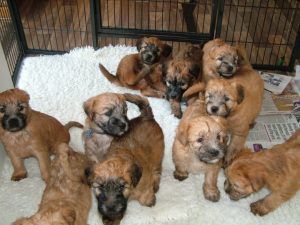
Is there an Endorsement on your Bitch's Pedigree?
Endorsements can only be placed on puppy registrations by the breeder before a dog is sold.
The endorsement ‘Progeny Not Eligible for Registration’ prevents any progeny from being registered by the Kennel Club.
You will need to check your bitch’s Kennel Club registration documents to see if this endorsement has been placed and if it has, you will need to ask the breeder if they are willing to contact to the KC and have it lifted.
Further information regarding endorsements can also be found on the Kennel Club website by going to the following link – https://www.thekennelclub.org.uk/dog-breeding/first-time-breeders/rearing-and-raising-your-puppies/ . Scroll down to the section CHECKLIST OF THINGS TO DO and there is a section under this called INFORMATION ABOUT KC ENDORSEMENTS. Click on this to expand the information.
Are you knowledgable enough about the genetic conditions which can affect SCWT?
Before you make any decision about breeding, it is strongly recommended that you understand as much as possible about the hereditary diseases which can affect our breed. Responsible breeders plan matings with the aim of eradicating these conditions, without adversely affecting genetic diversity. Research the ancestors in your bitch’s pedigree and check if any of them are recorded on the various SCWT health lists.
It is the Club’s practice, and in line with our Code of Ethics, to list details of Soft-Coated Wheaten Terriers who die of, or are suspected of having died of, a hereditary disease; or in the case of RD, to list the parents of Wheaten Terriers proven to have produced offspring with cases of RD. This information is made available to the Membership in the lists below.
Wheaten Terriers diagnosed as Losing Protein by a recognised Veterinary Specialist
*A List – Wheatens clinically proven by post mortem or biopsy to have been affected by PLE/PLN
*B List – Wheaten clinically shown as, or suspected to be, losing protein by a specialist veterinary advisor based on Veterinarian’s records and blood/urine tests.
As there is no clear mode of inheritance for Protein Losing diseases the affected dog is listed.
Please click on the following link to download the Losing Protein lists in a new page – Protein Losing A & B Lists
Parents of Wheaten Terriers which have produced one or more offspring affected by Renal Dysplasia diagnosed by post mortem or clinically deduced by recognised Veterinary Specialists.
*A/1 List – Wheaten matings clinically proven by post mortem to have one or more offspring affected by Renal Dysplasia – proven by post mortem.
*A/2 List – Wheaten matings which have produced one or more offspring clinically deduced to have died from RD by a specialist veterinary expert. (see caveats on list for further information)
*B List – Wheaten matings which have produced one or more offspring clinically deduced to have died from RD and diagnosis agreed from the dog’s veterinary case notes by our two veterinary experts.
Please click on the following link to download the Renal Dysplasia lists in a new page – Renal Dysplasia – A1, A2 & B Lists
To view and/or download a 5-generation trial mating pedigree for a mating published in the Club’s A1, A2 or B Renal Dysplasia lists, please go to the Health menu of the website, Conditions Affecting The Breed option, and under the Renal Dysplasia section you will find links to a pedigree for each mating listed.
The above lists are also published in our Club Bulletins and Year Books. Similar lists are also published by the Clubs in Sweden, Finland and the USA.
However, these lists are not definitive and rely on the honesty of breeders and owners reporting Wheatens who:
a) have been clinically proven to have been affected by Protein Losing Nephropathy (PLN) or Protein Losing Enteropathy (PLE)
b) have been shown or suspected to be losing protein
c) are related to matings which have produced puppies affected by Renal Dysplasia
Have you carried out the recommended health checks on your Bitch?
The Soft-Coated Wheaten Terrier is generally considered to be a healthy breed.
Health testing of breeding stock before mating is recommended in order to maintain this status and reduce the chance of inherited disease.
If you are a member of the SCWT Club of GB, you should abide by the Code of Ethics which can be found on this website – page titled ‘ THE CLUB AND OUR JUDGES’. If you are intending to breed a litter, the Code of Ethics, sections 23 – 34 refers specifically to breeding and health testing.
The following link will take you to information about the health tests you should carry out and how and where to get them done – WHI – Health Testing for Breeding
These recommendations have been formulated to maintain and improve the health of future generations of Soft-Coated Wheaten Terriers.
Even if you are not a member of the SCWT Club of GB, it is strongly recommended that you also carry out all of the above.
Do you have sufficient knowledge and resources to deal with the practical side of raising a litter?
* Do you know how to correctly care for your pregnant bitch?
* Are you confident you will cope with the whelping and be able to identify a situation where your bitch may need immediate veterinary help?
* Do you have the financial resources to pay for any veterinary emergency? A Caesarian section can be very expensive, particularly if it is carried out late at night or on a Sunday/Bank Holiday.
* In a worst case scenario, you could lose your bitch and some or all of the puppies.
* If your bitch died, would you have the time and energy to hand rear what could be a large litter of puppies? You would have to commit to ’round the clock’ bottle feeding until they could be weaned.
* Would you be in a position to take back or rehome any puppies or older dogs you have bred?
* Are you confident that you can find GOOD homes for your puppies. Meeting and vetting prospective owners can take up many hours particularly if you have a large litter.
* It is your responsibility to ensure that future owners have done their homework and know the breed and its characteristics. It is vital that they understand the specific requirements of Wheatens and know that they are taking on a bouncy, exuberant terrier with significant grooming requirements.
* Do you have the knowledge to provide your puppy owners with ongoing help, advice and support?
* Do you have the knowledge to provide an information pack for your owners? This should, at minimum, include information on diet, socialisation, training, grooming, immunisation and worming. N.B. The Club have produced a detailed and comprehensive Puppy Information Pack, covering all these topics and more, which can be purchased by Club Members.
If you are a new or inexperienced breeder, the Kennel Club also provides a large number of resources to improve your knowledge. Please go to https://www.thekennelclub.org.uk/dog-breeding/
The following is a link to the Kennel Club checklist for owners thinking about breeding from their bitch where you will find more information that you should consider first – https://www.thekennelclub.org.uk/dog-breeding/first-time-breeders/
If you still feel ready to mate your bitch and raise a litter, your next job will be to find a suitable sire for your litter. Finding the best sire for your litter is something which ideally, you should start doing months before you want to breed your bitch. It is not a decision to be taken in a hurry.
Choosing a suitable Sire
When looking for a sire, the breeder of your bitch should be consulted first. They will know her pedigree and should be able to give you advice on a suitable dog. Care must be taken to ensure that the pedigree lines of the dam and the sire are compatible and you are not ‘doubling up’ on listed, known producers of any of the inherited conditions previously mentioned.
The Club’s Health Team maintain a database which records the pedigrees of all U.K. Kennel Club registered, Soft-Coated Wheaten Terriers. Because many of the pedigrees of U.K. Wheatens contain dogs from around the world, the Club database also records a large number of Wheatens registered globally. The registration details of your bitch and any potential stud dogs can be used to produce ‘trial matings’. These will provide you with a lot of important information; i.e. the pedigree of the proposed puppies, an ancestral analysis and a coefficient of inbreeding (COI) using ten generations.
To request a trial mating from the Health Team, please email them using the following link – Health Team .
What is 'Coefficient of Inbreeding?
Coefficient of Inbreeding (COI) measures the common ancestors of the sire and dam of a proposed litter and indicates the probability of how genetically similar they are; a factor you need to be aware of and take into account when planning a mating. The articles on the following links give an explanation of the importance of COI and what it means:
http://www.instituteofcaninebiology.org/blog/coi-faqs-understanding-the-coefficient-of-inbreeding
http://www.dogbreedhealth.com/a-beginners-guide-to-coi/
N.B. When you are researching pedigrees and looking through the published health lists, be aware that just because a dog does not share an affix or kennel name with your dog or its parents, this does not always mean that they are not closely related.
You can check a dog’s COI on the Kennel Club website at the following link: – https://www.thekennelclub.org.uk/search/inbreeding-co-efficient/
Trial matings pedigrees can also be produced using on the Endowment Database www.scwtdb.org where you can also check the overuse of popular sires.
The danger of the overuse of popular Sires
The term ‘popular sire’ refers to dogs who have produced a significant number of puppies in relation to the breed population size. These dogs are typically, but not always, big winners in the show ring and breeders select them to sire litters because they have characteristics which they wish to replicate, i.e. the dog carries desirable genes.
However, no dog is genetically perfect, all dogs carry genetic mutations. If a dog carries two copies of an affected allele, he will pass one copy on to all his offspring. If he has one copy, there is still a chance that his puppies will inherit the affected copy.
The danger to the health of a breed can occur when one individual dog sires a large percentage of the puppies in the breed. In a short space of time, his genes, good and bad, become widely spread throughout the population, significantly increasing the probability that future generations will inherit two copies of any deleterious mutation carried by the popular sire and subsequently produce puppies affected by genetic disorders.
What next?
When you have a selection of dogs that are genetically compatible with your bitch, you raise the chances of breeding healthy puppies and you can now start looking at each dog from an aesthetic point of view.
* You need to choose a dog who complements your bitch. Remember your aim is to produce puppies that conform to the breed standard and hopefully be better examples of the breed than either parent.
* You should look for a dog who does not carry the same faults as your bitch, e.g. if your bitch does not have the best of tailsets, look at dogs in your selection who have perfect tailsets in the hope that the puppies will inherit the sire’s and not their mother’s!
* Look again at your copy of the Breed Standard and compare your bitch and any potential sire to it. Look at specific details such as eye colour, pigmentation, coat colour and texture and the size and breed type of each dog. Remember that in a terrier breed, a good bite is of major importance along with the overall conformation of the dog/bitch.
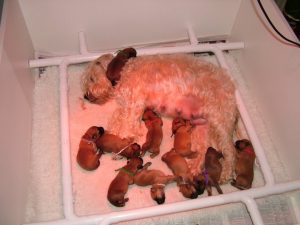
The Importance of Temperament
You will now have narrowed down your search and if you are lucky, you will have several dogs who fit the criteria above.
However, before you make a choice, an extremely important consideration is the temperament of the stud dog; your puppies will become family pets and need to be easy to live with, reliable, good natured dogs.
The mother of the puppies will have the greatest influence on their temperaments during the weeks she is caring for them but temperament is a trait which can be inherited from either or both parents and you should be sure that the dog you choose has a good, solid nature.
If you are not already familiar with the dog when you contact his owner to discuss a possible mating, ask if you can meet the dog beforehand. Try and do this both at his home and at Club events or dog shows where you can see how he reacts to other dogs and people.
You could also ask other breeders, who have used him as a stud dog, about the temperament of any puppies he has produced.
You can find details of any litters a dog has sired on either the Club’s database, or on the SCWT Endowment at www.scwtdb.org
The Stud Dog
When you approach the owner of a stud dog to ask if they are willing for him to be mated with your bitch, be prepared for them to ask you questions about her and be honest in your replies.
If they are agreeable to the mating, let them know when you expect her to be in season. You don’t want to make all these arrangements and then find the stud dog owner is on holiday when you need to have your bitch mated.
* Check that the stud dog has had the recommended health tests and ask to see the results.
* Ask if there is a ‘progeny not for registration’ endorsement on the stud dog’s pedigree. If the owner of the stud is not his breeder, the owner will need to find out when the endorsement will be lifted and provide you with the details in writing to prevent any misunderstandings.
* Expect the stud dog owner to request copies of your bitch’s health tests. If a mating is agreed and puppies result, you should give copies of the health test results from both sire and dam to your new puppy owners. You will also need to provide copies of both sets of results if you wish to use the Club’s Litter Advert service.
* To avoid any problems or misunderstandings, many stud dog owners will have a stud dog contract which they will expect you to sign; you should ask for a copy of this before any mating takes place and be clear about the terms both sides are agreeing to.
* A typical stud dog contract will specify the amount of the stud fee, the number of matings and when and under what circumstances the stud fee will be paid. Following a successful mating, if no litter is produced, many stud dog owners will agree to a ‘free mating’ the next time the bitch comes into season.
Click on the link below to see a UK Kennel Club example of a stud dog contract.
https://www.thekennelclub.org.uk/media/3039/guide-to-stud-dog-contract.pdf
Further information regarding endorsements can also be found on the Kennel Club website by going to the following link – https://www.thekennelclub.org.uk/dog-breeding/first-time-breeders/rearing-and-raising-your-puppies/ . Scroll down to the section CHECKLIST OF THINGS TO DO and there is a section under this called INFORMATION ABOUT KC ENDORSEMENTS. Click on this to expand the information.
Pre-Mating Preparations
- By the time your bitch comes into season/heat, she must be in peak physical condition. It is hard work feeding and caring for puppies, particularly if she has a large litter.
- If you are going to worm your bitch, this should be done before her season is due; she may be ready for mating early in her cycle and treatments such as worming, flea treatment and vaccination are not something you want to do when she is pregnant. N.B. Vaccination against the Canine Herpes Virus is the exception to this. (see below for information about CHV)
- If you have been keeping a record of when your bitch usually comes into season, you should have a reasonable idea of when she is due again. Keep a close eye on her so you don’t miss the first day of the cycle.
- As soon as you know she is in season, you should contact the owner of the stud dog to let them know you will soon be needing his services.
Predicting Ovulation - Timing the Mating
To achieve a successful mating which results in puppies, you need to know when your bitch is about to ovulate (release eggs from her ovaries). She could ovulate at any point in her season, as early as day 5 or as late as day 30. When a bitch starts her season, the levels of the reproductive hormone progesterone, in her system, begin to slowly rise with a sharp increase on the day she ovulates. It then takes around 48 hours for the released eggs to mature, ready for fertilisation. Experienced breeders become familiar with the physical signs that show their bitch is ready for mating but if you are a novice or uncertain, there are several different methods you can use to predict or identify ovulation, giving you time to arrange your visit to the stud dog.
Progesterone assay – This test measures the level of progesterone in a sample of blood which needs to be taken by a vet. You should have this done first thing in the morning; some vets will have their own analyser in-house but most vets will need to send the sample off to a laboratory for testing, with the results being ready later in the day or early next day. It is essential to start testing progesterone levels early because ovulation can occur at any point in the cycle. The ‘text book’ time for mating is 12 – 14 days after the first sign of heat but some bitches ovulate early and some very late. If you rely on this ‘myth’ and your bitch is an ‘early ovulator’, you may miss the optimum time for a successful mating. Just to make things even more uncertain, some bitches ovulate at different times in different seasons so if you mate her on day 10 and she gets pregnant, don’t assume that the next time you plan a litter, she will be ready on day 10 again!
Ovulation occurs two days after a surge in luteinising hormone (LH) when the level of progesterone is between between 15 and 20 nmol/l (please note that some tests and some countries use different units to measure progesterone, i.e. ng/ml and in that case ovulation occurs between 5 – 7 ). After ovulation it takes approximately 48 hours for eggs to mature before they can be fertilised and it takes around 12 hours after ejaculation for fresh sperm cells to be able to fertilise an egg. Once a dog has successfully mated a bitch, sperm cells can live for up to five days in her reproductive tract. The optimum time for mating is two days after ovulation but matings just before ovulation can still result in puppies. It is usually recommended that you arrange two matings, 24 – 48 hours apart.
Vaginal Cytology/ovulation swab test – This is a simple and relatively inexpensive process in which a vaginal swab is taken from your bitch. The collected cells are then examined under a microscope to provide an accurate and reliable status of your bitch’s fertility and ovulation period within her season. This method can forecast a bitch’s ovulation process within a three day time span and also confirm that she is having a genuine season and not a pseudo season which can occur, particularly if she lives with other entire bitches. The swabs can be ordered online before your bitch comes into season. There are several laboratories which offer this service and it is worth asking breeders who live in your area, which one they use. If you live within travelling distance, you may be able to take your bitch to the tester and get the results immediately. Below are links to just some of the service providers. You should order a supply of swabs before your bitch comes into season and begin testing after two or three days of the first day of heat. The swab test can also show if your bitch has any vaginal infection present.
http://www.rockforcegsd.co.uk/ovulation_testing.html
http://www.caninebreedingservices.co.uk
https://www.k9progesteroneuk.co.uk
If you are planning to breed using artificial insemination (A.I.), predicting the time of ovulation is important because you won’t have any signs from a stud dog that she is at the right point in her cycle. There are different reasons why A.I. may be required, e.g. the chosen stud lives outside of the UK, or maybe you are using frozen semen from a deceased dog.
Canine Herpes Virus (CHV) & the Potential Danger to Unborn & Newborn Puppies

CHV is a common virus in the dog population. Some estimates say that as many as 70% of adult dogs will come into contact with the virus at some point in their lives. This is not a problem for an adult dog but in puppies before birth or less than three weeks old, it can be devastating.
When an adult dog becomes infected with CHV, they may not show any obvious symptoms. CHV is a mild disease usually resulting in an upper respiratory infection; it is one of the causes of kennel cough. Male dogs can sometimes develop lesions on their genitals but in the female dog there may be no outward signs.
Why is CHV a particular danger to pregnant females and their puppies?
It has now been shown that CHV is a significant cause of some of the fertility problems experienced by breeders, e.g.
* ‘Missed matings’ where a successful mating does not result in pregnancy
* Spontaneous abortion or re-absorption of some or all of the unborn puppies.
* Still born puppies
* Fading Puppy Syndrome where puppies fail to thrive and ‘fade away’ after a few days.
The virus replicates best at temperatures below 37°C. With an adult dog’s normal body temperature of around 38.5°C, the virus does not cause too many problems before the immune system responds. However, puppies from birth to three weeks of age have immature immune systems and cannot regulate their own body temperature, allowing the virus to replicate rapidly, causing severe symptoms which can be fatal.
How does an adult dog become infected?
The virus is not airborne and is passed from dog to dog via close contact, i.e. nasal, oral and vaginal secretions passed by coughing and sneezing, when sniffing and licking and also during mating. It is a relatively fragile virus which does not last long in the environment. It is easily destroyed in bright sunlight and with a good hygiene regime using disinfectant. However, once inside the body of a dog it thrives and when the initial infection passes, the disease lies dormant in the nerve cells until re-activated in times of stress, much like the herpes simplex virus which causes cold sores in humans.
How do puppies become infected?
The biggest danger to both unborn and newborn puppies is when the mother’s initial infection is just before or during her first pregnancy. She will have no antibodies at this point and the outlook for the puppies is very poor. If the mother was previously infected with CHV and it becomes reactivated from the stress of mating, pregnancy or labour, she may shed live virus and infect her puppies. Depending on when the virus reactivates, puppies may be infected in utero or in the birth passage during whelping. They can also become infected by their mother’s saliva as she licks to clean them in the first days after birth.
Can you prevent these problems?
There is a vaccine available in the UK and Europe. Eurican Herpes 205 is a subcutaneous injection given in two doses. The first can be given either during heat or 7 – 10 days after mating and the second 1 – 2 weeks before the expected date of whelping. The vaccine causes the bitch’s immune system to produce antibodies which are subsequently passed on to her puppies.
If you choose not to use the vaccine, there are some steps you can take to lower the risk of possible CHV infection.
* Pregnant bitches should be isolated from other dogs in the home during the critical period for infection which is the last three weeks of pregnancy and the first three weeks after birth. Isolation is particularly important if your other dogs are taken to parks, dog shows or events where there are a large number of dogs present.
* Keep your bitch warm, well fed and in clean conditions. A good hygiene regime, using disinfectants will help to minimise any risk from the virus.
* Because the virus needs a low temperature to survive, when puppies are born they should be kept warm by providing an external source of heat such as a heat lamp or heat pad in the whelping box.
N.B. There have been occasional problems with the supply chain for the vaccine so if you decide to vaccinate your bitch, it would be sensible to contact your veterinary practise well before a mating takes place to check that they will have supplies available when you need them.
The Mating
As mentioned before, the mating process is well documented both in books and online articles. If you are a novice breeder, read as much as possible about the subject beforehand, talk to other breeders and try to find yourself a mentor who you can contact for help and advice.
Below is a list of recommended books which are readily available. There are also many videos online which show the birth of puppies; just go to YouTube and select Wheaten Terrier giving birth. The link below will take you to just one of them.
https://www.youtube.com/watch?v=qsIwcYQG1Ns
Books: The Book of the Bitch: J.M. Evans & Kay White – ISBN 978-1860540233
Breeding Dogs: A Practical Guide: Patsy Hollins – ISBN 978-1847972576
The Complete Book of Dog Breeding: Dan Rice – ISBN 978-0764138874
There is also a huge amount of information, available in books and online, about the care of puppies from birth to eight weeks of age when they begin to go off to their new homes.
Once The Pups Are Born
Once your litter is safely on the ground, there are a number of things which you must do to ensure they grow and develop into healthy and well-socialised puppies.
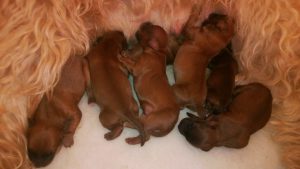
The most important of these tasks is socialising the puppies. Effective socialisation in the first few weeks of life is absolutely vital. A puppy who has been thoughtfully socialised by the breeder will find it so much easier to integrate into the life of its new family and be fit for function as a family pet and much less likely to have problems when encountering new and possibly frightening experiences.
Socialisation in the First Eight Weeks
There are two parts to socialisation. One is teaching a puppy to be social, both towards humans and any other dogs in the home.
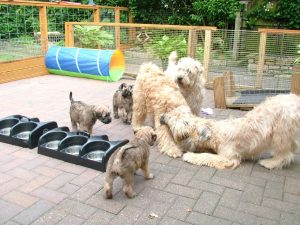
The second is teaching the puppy not to be worried by everyday household events such as sweeping and mopping floors and noises from vacuum cleaners, dishwashers, doorbells ringing, the delivery man and the window cleaner.

Socialisation begins as soon as a few days after birth and the work that you put in during the next eight weeks will have a direct impact on the future emotional well-being of each of your puppies.
Health Tests on the Litter
Responsible breeders, prior to homing their puppies, undertake tests on their litters.
These may include:
Basic kidney function – This is a blood test taken at approximately 7-8 weeks of age to assess kidney function:
* Creatinine
* Urea (BUN)
* Phosphate (This is not usually significant if elevated in young, healthy growing dogs)
Eye test – At approximately 6-8 weeks of age a BVA approved Ophthalmic Vet can check for retinal folds and other eye diseases.
Copies of the test results should be given to new owners, and the committee’s health team would be grateful if you could provide a copy for the Club’s health files.
Puppy Information Packs
You will need to provide each new owner with an information pack covering all of the following:
* The early days in a new home
* Diet
* Ongoing socialisation
* Exercise – how much
* Grooming
* General advice on health and welfare
* Health issues – specifically those conditions to which the SCWT is pre-disposed, e.g. RD, PLN and PLE
Some breeders choose to compile their own information packs but the Club has a very comprehensive pack which as a member you can order through the following email : puppypack@wheaten.org.uk
Endorsements, Registrations, Contracts & Microchipping
You will also need to register your litter with the Kennel Club and provide your new owners with a copy of their puppy’s KC registration papers.
Before you register the litter there is an important consideration to be made:
ENDORSEMENT OF PEDIGREES
The majority of SCWT breeders endorse the pedigrees of the puppies they sell. There are two endorsements which only you, as the registered breeder, can place on a pedigree while the dog is still in your physical possession.
1. Progeny not eligible for Registration
2. Not eligible for issue of an Export Pedigree
Therefore the registrations must be received by the Kennel Club before the puppy leaves the breeder. You as the endorsee must obtain written and signed confirmation of knowledge of the endorsements, from the new owner before or on the date on which the dog is physically transferred to their ownership.
Further information regarding endorsements can also be found on the Kennel Club website by going to the following link – https://www.thekennelclub.org.uk/dog-breeding/first-time-breeders/rearing-and-raising-your-puppies/ . Scroll down to the section CHECKLIST OF THINGS TO DO and there is a section under this called INFORMATION ABOUT KC ENDORSEMENTS. Click on this to expand the information.
CONTRACT OF SALE
It is strongly recommended that you provide each new puppy owner with a contract of sale. This protects both you as the seller and the buyer of the puppy and should clearly set out details and any conditions attached to the sale. You can find examples of a Sales Contract and how to correctly place endorsements on the ‘Dog Breeding’ section on the Kennel Club website.
MICROCHIPPING OF PUPPIES
It is now mandatory throughout the United Kingdom for breeders to be recorded as the first keeper of a puppy, breeders are required by law to have puppies microchipped and recorded on a government compliant database by the time they are eight weeks old.
The Puppy Pack produced by the Club has useful information on microchipping and transfer of ownership of puppies.
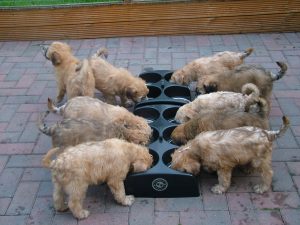
Downloadable Version of Breeding Information
If you would prefer to download a copy of the Breeder Information shown above, please click on the following link, which will download a PDF version, in a new page, which you can print off or save – Breeder Information Document



